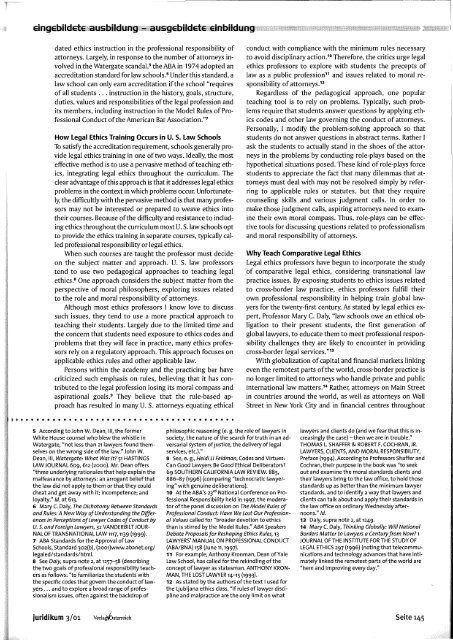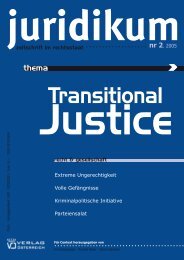Download - juridikum, zeitschrift für kritik | recht | gesellschaft
Download - juridikum, zeitschrift für kritik | recht | gesellschaft
Download - juridikum, zeitschrift für kritik | recht | gesellschaft
Erfolgreiche ePaper selbst erstellen
Machen Sie aus Ihren PDF Publikationen ein blätterbares Flipbook mit unserer einzigartigen Google optimierten e-Paper Software.
eingebildeteausoildung .... 'ausgebildeteEinbildung· ..dated ethics instruction in the professional responsibiIity ofattorneys. Largely, in response to the nu mb er of attorn eys involvedin the Watergate scandal,s the ABA in 1974 adopted anaccreditation standard for law schools. 6 Under this standard, alaw school can only earn accreditation ifthe school "requiresof all students ... instruction in the history, goals, structure,duties, values and responsibilities ofthe legal profession andits members, including instruction in the Model Rules ofProfessionalConduct ofthe American Bar Association."7How Legal Ethics Training Occurs in U. S. law SchoolsTo satisfy the accreditation requirement, schools generally providelegal ethics training in one oftwo ways. Ideally, the mosteffective method is to use a pervasive method ofteaching ethics,integrating legal ethics throughout the curriculum. Thec1ear advantage of this approach is that it addresses legal ethicsproblems in the context in wh ich problems occur. UnfortunateIy, the difficultlywith the pervasive method is that many professorsmay not be interested or prepared to weave ethics intotheir courses. Because ofthe difficulty and resistance to includingethics throughout the curriculum most U. S. law schools optto provide the ethics training in separate courses, typically calledprofessional responsibility or legal ethics.When such courses are taught the professor must decideon the subject matter and approach. U. S. law professorstend to use two pedagogical approaches to teaching legalethics. 8 One approach considers the subject matter from theperspective of moral philosophers, exploring issues relatedto the role and moral responsibility of attorneys.Although most ethics professors I know love to discusssuch issues, they tend to use a more practical approach toteaching their students. Largely due to the Iimited time andthe concern that students need exposure to ethics codes andproblems that they will face in practice, many ethics professorsrely on a regulatory approach. This approach focuses onapplicable ethics rules and other applicable law.Persons within the academy and the practicing bar havecriticized such emphasis on rules, believing that it has contributedto the legal profession losing its moral compass andaspirational goals. 9 They believe that the rule-based approachhas resulted in many U. S. attorneys equating ethicalconduct with compliance with the minimum rules necessaryto avoid disciplinary action. lU Therefore, the critics urge legalethics professors to explore with students the precepts oflaw as a public profession ll and issues related to moral responsibilityof attorneys.12Regardless of the pedagogical approach, one popularteaching tool is to rely on problems. Typically, such problemsrequire that students answer questions by applying ethicscodes and other law governing the conduct of attorneys.Personally, I modifY the problem-solving approach so thatstudents do not answer questions in abstract terms. Rather Iask the students to actually stand in the shoes of the attorneysin the problems by conducting role-plays based on thehypothetical situations posed. These kind of role-plays forcestudents to appreciate the fact that many dilemmas that attorneysmust deal with may not be resolved simply by referringto applicable rules or statutes, but that they requirecounseling skiIIs and various judgment calls. In order tomake those judgment calls, aspiring attorneys need to examinetheir own moral compass. Thus, role-plays can be effectivetools for discussing questions related to professionalismand moral responsibility of attorneys.Why Teach Comparative legal EthicsLegal ethics professors have begun to incorporate the studyof comparative legal ethics, considering transnational lawpractice issues. By exposing students t'Ü ethics issues relatedto cross-border law practice, ethics professors fulfill theirown professional responsibility in helping train global lawyersfor the twenty-first century. As stated by legal ethics expert,Professor Mary C. Daly, "Iaw schools owe an ethical obligationto their present students, the first generation ofglobal lawyers, to educate them to meet professional responsibilitychallenges they are likely to encounter in providingcross-border legal services."13With globalization of capital and financial markets Iinkingeven the remotest parts ofthe worId, cross-border practice isno longer Iimited to attorneys who handle private and pubIicinternational law matters. 14 Rather, attorneys on Main Streetin countries around the worId, as weIl as attorneys on WallStreet in New York City and in financial centres throughout, i • • • • • • • • • • • • • • • • • • • • • • • • • • • • • • • • • • • • • • • •S According to John W. Dean, 111, the formerWhite House counsel who blew the whistle inWatergate, "not less than 21 lawyers found themselveson the wrong side ofthe law." John W.Dean, 111, Watergate: What Was It? 51 HASTINGSLAW JOURNAL 609, 612 (2000). Mr. Dean offers"three underlying rationales that help explain themalfeasance by attorneys: an arrogant beliefthatthe law did not apply to them or that they couldcheat and get away with it; incompetence; andloyalty." Id. at 613.6 Mary C. Daly, The Dichotomy Between Standardsand Rules: A New Way of Understanding the Differencesin Perceptions of Lawyer Codes of Conduct byU. S. and Foreign Lawyers, 32 VANDERBILT JOURNAL OF TRANSNATIONAL LAW 1117, 1139 (1999).7 ABA Standards for the Approval of LawSchools, Standard 302(b), (2001)www.abanet.org/legaled/standards/html.8 See Daly, supra note 2, at 1257-58 (describingthe two goals of professional responsibility teachersas folIows: "to familiarize the students withthe specifie codes that govern the conduct of lawyers... and to explore a broad range of professlonalismissues, often against the backdrop ofphilosophie reasoning (e. g. the role of lawyers insociety, the nature ofthe search fortruth in an adversarialsystem of justice, the delivery of legalserviees, etc.)."9 See, e. g., Heidi Li Feldman, Codes and Virtues:Can Good Lawyers Be Good Ethieal Deliberators?69 SOUTHERN CALIFORNIA LAW REVIEW. 885,886-87 (1996) (comparing "technocratic lawyering"with genuine deliberations).10 At the ABA's 23'd National Conference on ProfessionalResponsibility held in 1997, the moderatorofthe panel discussion on The Model Rules ofProfessional Conduct: Have We Lost Our ProfessionalValues ca lied for "broader devotion to ethicsthan is stirred bythe Model Rules." ABA SpeakersDebate Proposals for Reshaping Ethics Rules, 13LAWVERS' MANUAL ON PROFESSIONAL CONDUCT(ABA/BNA) 158 (June 11, 1997).11 For example, Anthony Kronman, Dean ofValeLaw School, has ca lied for the rekindling oftheconcept of lawyer as statesman. ANTHONV KRONMAN, THE LOST LAWVER 14-15 (1993).12 As stated by the authors ofthe text I used forthe Ljubljana ethics class, "If rules of lawyer discipline and malpractice are the only limit on whatlawyers and clients do (and we fear that this is increasinglythecase) -then we are in trouble."THOMAS L. SHAFFER & ROBERT F. COCHRAN, JR.LAWVERS, CLiENTS, AND MORAL RESPONSIBILlTV,Preface (1994). According to Professors Shaffer andCochran, their purpose in the book was "to seekout and examine the moral standards clients andtheir lawyers bring to the law office, to hold thosestandards up as better than the minimum lawyerstandards, and to identify a way that lawyers andclients can talk about and apply their standards inthe law office on ordinary Wednesday afternoons."Id.13 Daly, supra note 2, at 1249.14 Mary C. Daly, Thinking Globally: Will NationalBorders Matter to Lawyers a Century from Now? 1JOURNAL OF THE INSTITUTE FOR THE STUDV OFLEGAL ETHICS 297 (1996) (noting that telecommunieationsand technology advances that have Intlmatelylinked the remotest parts ofthe world are"here and improving every day."<strong>juridikum</strong> 3/01verla~sterreichSeite 145
















